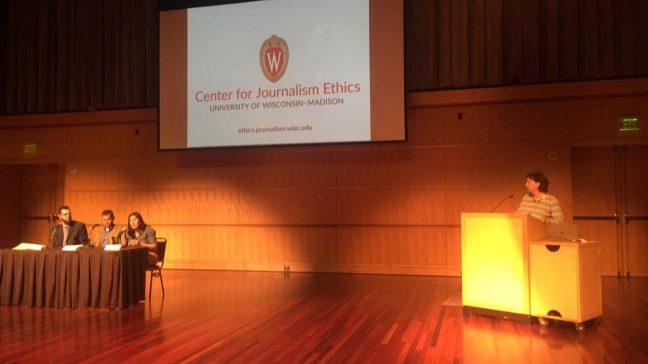The Center for Journalism Ethics held a panel Wednesday to discuss the difficulties for a journalist to report on health care.
The panel consisted of Vox health care reporter Sarah Kliff, University of Wisconsin associate professor in the Department of Medical History and Bioethics J. Paul Kelleher and David Wahlberg, a health care reporter at the Wisconsin State Journal.
The panelists discussed the public’s dissatisfaction with the media’s continued framing of the healthcare debates, specifically the efforts to repeal the Affordable Care Act, as a “conflict narrative” between politicians.
People have a right to be upset with the uneven attention journalists show to the public, Kliff said. The media often focuses on the political drama of the healthcare debates rather than the substantive facts of the policies.
Local news, in particular, largely neglects to make much effort to make policy proposals accessible to the public because of “horse-race coverage,” Kliff said.
“I think the tension that deserves more coverage is between the policies that are being discussed in Washington and the actual outcomes that might happen across the country,” Kliff said.
Dane County legislators address concerns of future health care in Wisconsin at town hall
Wahlberg, disagreeing slightly, said the conflict narrative in health care news is part of the journalist’s duty to reflect public discourse. The dominant health care conversation across the country is one of tension and conflict, he said.
But journalists also have a duty to explain health care issues to their readers, Wahlberg said. Facts like the raw number of uninsured citizens or the high cost of health care in the U.S. compared to the rest of the world, he added, need to be revealed to the public.
Because of media coverage on healthcare, Kliff said there was a 35 percent increase in the amount of individuals enrolled in ACA this year versus the previous year.
In a report where Kliff followed Wisconsin health care navigators — people who help others sign up for ACA coverage — she discovered media played a significant part in getting people to sign up for health care.
Kliff found some of these people chose to enroll after watching or reading the news.
With two days to open enrollment, Obamacare changes stir confusion
Despite some journalist’s efforts to cover health care issues as in depth as possible, Kelleher said many people don’t know the facts about Medicaid, like how the majority of costs go to the aged and disabled.
The problem journalists face is how to spread information to everyone that needs to know it, he said.
“It’s not that these numbers aren’t being reported in certain places, I just think there are a lot of people who don’t know them and they are not being reported where they’re consuming their news,” Kelleher said.
Wahlberg said regardless of the journalist’s personal beliefs, it’s important for them to remain balanced on this issue.
In the future, Wahlberg envisions reporting on the health care debate differently from reporting on climate change or vaccines, where the science seems to line up on one side.
“I’m learning, at least through my reporting, that this divide exists in some conservative areas of the country about who deserves health care, and that it should not be a right, that it should be something you earn through hard work and your actions,” Kliff said.
Beyond the conflict narrative populating a lot of media’s coverage of the health care debate, Kelleher said it’s important for journalists to “drill down” to what they see as the core of the debate: The cost of medical care.
The high cost of health care must be seen as a common result of conscious policy choices, like “government issued monopolies” in the form of pharmaceutical patents, Kelleher said.
“It is not the fact that high medical prices, or at least as high as we have them, are built into the fabric of the universe,” Kelleher said.
Journalist explains strategies to resist Trump administration, expand global view
Despite the complexity of an issue like health care, Kliff said the belief that people don’t want to grapple with these complexities is a fallacy. People truly want “in depth explanations,” she said.
But Kliff said it’s imperative for journalists to make these explanations compelling. Policy has often been considered the “vegetables of the newspaper,” where the reader feels a sense of obligation to read, but is bored and unhappy doing so, desiring instead to have the the politics section as “dessert.”
“But you can have really delicious vegetables,” Kliff said. “And that’s all because of the decisions we make covering policy, about — okay — we’re going to treat this as interesting.”

















